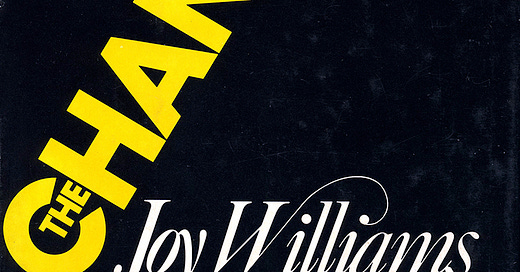One thing I’ve avoided so far in this series of follow-up books is talking about second novels. The second novel is a classic problem; like David Foster Wallace once said, a debut novel is a “really big shit” that you put everything you know into, so the standard challenge is: what’s to say after that? The second novel either repeats the first, builds off and surpasses the first, or, seemingly more often, falls short: the dreaded sophomore slump. (Hernan Diaz, hello!)
But with Joy Williams’ The Changeling, we have something else entirely, a second novel that didn’t so much surpass or fall short of the previous novel – State of Grace – as demolish it. State of Grace is a very good novel, a National Book Award finalist (tough when you’re going up against Gravity’s Rainbow), and also clearly a short story stretched out into a novel, a perfect middle section padded with a section on either side. The Changeling is a howling wild mess, a sustained attack on the conventional novel. Everyone loves a house metaphor – Alice Munro says that a story is like a house, and that “everybody knows what a house does, how it encloses space and makes connections between one enclosed space and another and presents what is outside in a new way” – and State of Grace is a beautiful small New England beach house with a couple additions on it, not awful looking by any means, but you can tell that the house was built piecemeal, without a total unity of purpose.1 The Changeling is more like the mound from Close Encounters of the Third Kind or the Supten house in Absalom, Absalom! or the Stamper house in Sometimes a Great Notion or simply just the loneliest, most imposing home down the lane, a fearsome singular vision imposed on the world. It is a better novel than State of Grace, but it also hardly feels fair to call them the same thing.
Look at the beginning of State of Grace:
There is no warning of daylight here. It is strange to know that it is only twenty miles to the Gulf of Mexico and all the dizzying impossible white light, for here there is such darkness.
And then The Changeling:
There was a young woman sitting in the bar. Her name was Pearl. She was drinking gin and tonics and she held an infant in the crook of her right arm. The infant was two months old and his name was Sam.
The first is your standard (if excellently crafted) lit-fic opening; the second is more like a fable, the once upon a time practically implied. It’s an immediate indicator that you are heading somewhere different than before.
And it was that stinging difference that led to The Changeling being roundly rejected by the reading public. The book was remaindered and went out of print for thirty years. Anatole Broyard, who had glowingly praised State of Grace in The New York Times, went back to The Times to absolutely rip The Changeling, writing a polemic against the book so cruel that William Gaddis could only call Joy Williams and say “Oh Joy, I’m so sorry.”2 Broyard took the occasion of the book’s release to take the entire literary ‘avant-garde’ to task with a sort of officious smarmy literalism:
"And then I believe it would be a salutary exercise for both reader and writer if we begin to take the rhetoric of the avant‐garde literally, to assume that the words on the page mean what the dictionary says they do. When Miss Williams writes, “Oh to bring back the days when stars spoke at the mouths of caves,” I feel entitled, perhaps even obliged, to ask, ‘Which days were those?’”
Never has the NYT style guide felt so mean, the “Miss Williams” dripping with condescension. Williams, in her Paris Review interview, says that the review was “nasty, and it did succeed in shutting [her] up for a while.” There were some short story collections in between, but it would be ten years before she put out another novel – a good long period of being shut up by a pan. And while the novels she wrote after The Changeling have all been excellent – everything Joy Williams writes is excellent – none of her books since then have matched the sustained formal and verbal experimentation of The Changeling. It is a star blazingly streaking across the sky of her oeuvre, too bright in its ambition to go for too long.
Keep reading with a 7-day free trial
Subscribe to Evan Reads to keep reading this post and get 7 days of free access to the full post archives.





